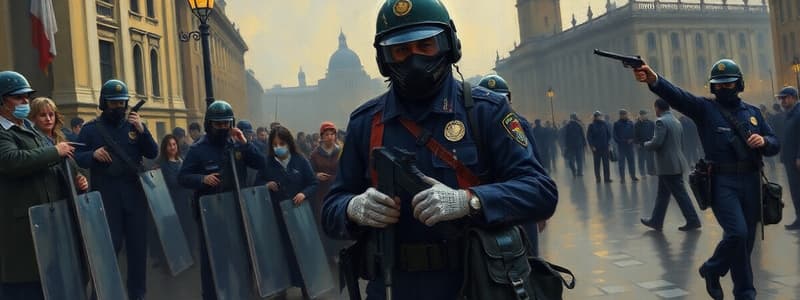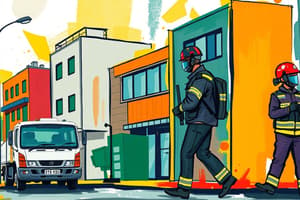Podcast
Questions and Answers
Which of the following are examples of uniformed statutory protective services? (Select all that apply)
Which of the following are examples of uniformed statutory protective services? (Select all that apply)
- Fire and Rescue Service (correct)
- National Health Service (NHS)
- Ambulance Service (correct)
- Highways England
- Police (correct)
- Custodial Services (correct)
What is the primary function of non-uniformed statutory services?
What is the primary function of non-uniformed statutory services?
To provide essential services to the public.
Which of the following is NOT a type of political system?
Which of the following is NOT a type of political system?
- Socialism (correct)
- Democracy
- Republic
- Monarchy
What is the primary role of the executive branch in the UK government?
What is the primary role of the executive branch in the UK government?
What is the primary role of the House of Commons in the UK Government?
What is the primary role of the House of Commons in the UK Government?
The House of Lords is an elected body.
The House of Lords is an elected body.
What is the purpose of the separation of powers in the UK government?
What is the purpose of the separation of powers in the UK government?
What is the primary role of local government?
What is the primary role of local government?
Which of the following are examples of local government structures? (Select all that apply)
Which of the following are examples of local government structures? (Select all that apply)
How do protective services obtain funding?
How do protective services obtain funding?
The impact of funding on public service delivery can result in changes to the level, extent, and quality of service provided.
The impact of funding on public service delivery can result in changes to the level, extent, and quality of service provided.
What is the primary purpose of protective services accountability?
What is the primary purpose of protective services accountability?
Which of the following is NOT a measure of efficiency and effectiveness in protective services?
Which of the following is NOT a measure of efficiency and effectiveness in protective services?
Government policies can have a significant impact on the lives of individuals and communities, and on the way that protective services are delivered.
Government policies can have a significant impact on the lives of individuals and communities, and on the way that protective services are delivered.
Describe the different processes involved in the development of government policies.
Describe the different processes involved in the development of government policies.
What are the key ways in which changes in government can impact protective services?
What are the key ways in which changes in government can impact protective services?
What are some ways that communities and individuals can be affected by government policies?
What are some ways that communities and individuals can be affected by government policies?
How can government policies affect protective services personnel?
How can government policies affect protective services personnel?
Give some examples of civilian responses to government policies.
Give some examples of civilian responses to government policies.
Flashcards
Protective Services
Protective Services
Services provided by government agencies to protect citizens and property.
Statutory Protective Services
Statutory Protective Services
Services provided by official government bodies like police, fire, and the military, responsible for maintaining order and safety.
Non-Statutory Protective Services
Non-Statutory Protective Services
Services that aren't legally mandated but are essential for society, like public transportation or utility companies.
Legislation
Legislation
Signup and view all the flashcards
Legal Requirements for Protective Services Delivery
Legal Requirements for Protective Services Delivery
Signup and view all the flashcards
Democracy
Democracy
Signup and view all the flashcards
Republic
Republic
Signup and view all the flashcards
Monarchy
Monarchy
Signup and view all the flashcards
Communism
Communism
Signup and view all the flashcards
The Executive
The Executive
Signup and view all the flashcards
Cabinet
Cabinet
Signup and view all the flashcards
Government Ministers
Government Ministers
Signup and view all the flashcards
Civil Servants
Civil Servants
Signup and view all the flashcards
Parliament
Parliament
Signup and view all the flashcards
Separation of Powers
Separation of Powers
Signup and view all the flashcards
Monarchy (Role of the Monarch)
Monarchy (Role of the Monarch)
Signup and view all the flashcards
House of Commons
House of Commons
Signup and view all the flashcards
House of Lords
House of Lords
Signup and view all the flashcards
Devolution
Devolution
Signup and view all the flashcards
Scottish Parliament
Scottish Parliament
Signup and view all the flashcards
Welsh Parliament
Welsh Parliament
Signup and view all the flashcards
Northern Ireland Assembly
Northern Ireland Assembly
Signup and view all the flashcards
Reserved Powers
Reserved Powers
Signup and view all the flashcards
Local Government
Local Government
Signup and view all the flashcards
Funding
Funding
Signup and view all the flashcards
Taxation
Taxation
Signup and view all the flashcards
Accountability
Accountability
Signup and view all the flashcards
Policy-Making Process
Policy-Making Process
Signup and view all the flashcards
Impact of Policies
Impact of Policies
Signup and view all the flashcards
Public Responses to Government Policies
Public Responses to Government Policies
Signup and view all the flashcards
Study Notes
Unit 6: Government and Protective Services
- Level: 3
- Unit Type: External
- Guided Learning Hours: 90
- Essential Content: Learners must cover all specified content before assessment. Content is organized by areas.
A Role and Scope of the Public Sector
-
Scope of Protective Services: Overview of statutory services maintaining law and order, emergency services, armed forces, custodial care, and other services like UK Visas, NHS, Highways, and ambulance services. Non-uniformed services include local authorities (councils), central government (schools, legal aid), and supporting services (e.g., reserves).
-
Legal Requirements for Protective Services Delivery:
- Difference between public and protective services (defining uniformed and non-uniformed services).
- Purpose of statutory services: responding to emergencies, preventing incidents, defending the UK, maintaining traffic flow, and custodial care.
- Legal requirements for various services (e.g., UK Visas, Highways England, NHS).
B Structure of UK Government and Protective Services
-
Political Systems: Overview of key principles like democracy, republic, monarchy, and communism (outline of different political systems).
-
The Executive: Roles and responsibilities of the executive, including the cabinet (setting strategic direction and policies), government ministers (implementing policies), and civil servants (implementing day-to-day government operations). Relevant government departments working with protective services (Ministry of Defence, Home Office, Ministry of Justice, etc.)
-
Parliament, Roles and Responsibilities: Understanding the institutions of state and separation of powers (monarchy's role, House of Commons composition, House of Lords composition (elected / appointed), and their respective roles).
-
Devolved Bodies, Roles, and Responsibilities: Overview of the transfer of powers to devolved bodies (UK nations). Specific roles of Scottish, Welsh, and Northern Ireland institutions of government.
-
Local Government, Roles, and Responsibilities: Role, structure (county councils, district, unitary, borough), responsibilities (services, partners, local priorities).
C Funding and Accountability
- Sources and Impact of Funding: Understanding the sources of funding for protective services (taxation, other sources like income, EU funds) and their impact on service capability and operation.
- Protective Services Accountability: Levels of accountability (public, stakeholders, employers), role of authorities (PCCs, IPCC), financial accountability needs. Effective budgets and measures of efficiency, effectiveness, and productivity.
D The Process and Impact of Government Policies
- Policy-making Process: Understanding different stages involved in the development of government policies (meetings, consultations, legal process), relevant actors (parliamentary committees, MPs, outside groups).
- Impact of Policies on Protective Services and Communities: Impact of policies on service provision, personnel, communities, and responses to policy changes (civil disobedience, protests).
Studying That Suits You
Use AI to generate personalized quizzes and flashcards to suit your learning preferences.




